Kickstart your journey to prosperity and positivity with our guide on lucky indoor plants in Feng Shui.
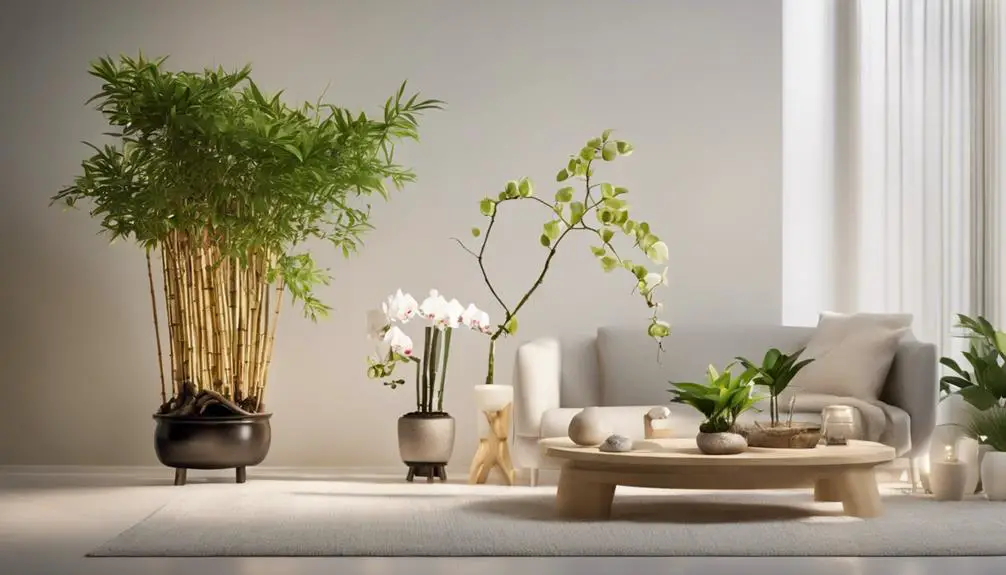
Lucky Indoor Plants Feng Shui
Just as a key unlocks a door, lucky indoor plants in Feng Shui can unlock potential prosperity and positive energy in your home or workspace. You're probably wondering how these plants can influence your surroundings and ultimately, your life.
Well, each plant is believed to contain certain energies and characteristics that can promote health, wealth, and happiness. But which plants are considered lucky and how can you maintain them?
Stay with us as we explore this intriguing intersection of botany and ancient Chinese philosophy.
Key Takeaways
- Feng Shui principles involve using plants like Jade, Lucky Bamboo, and Money Tree for attracting prosperity and positive energy.
- Caring properly for these plants, including watering and pest prevention, helps maintain their positive energy flow.
- Symbolism of plants in Feng Shui, such as wealth for Jade plant, is crucial for achieving balance and harmony.
- Strategic placement of plants, like Jade near the front door, can influence prosperity in key areas of your space.
Understanding Feng Shui Principles
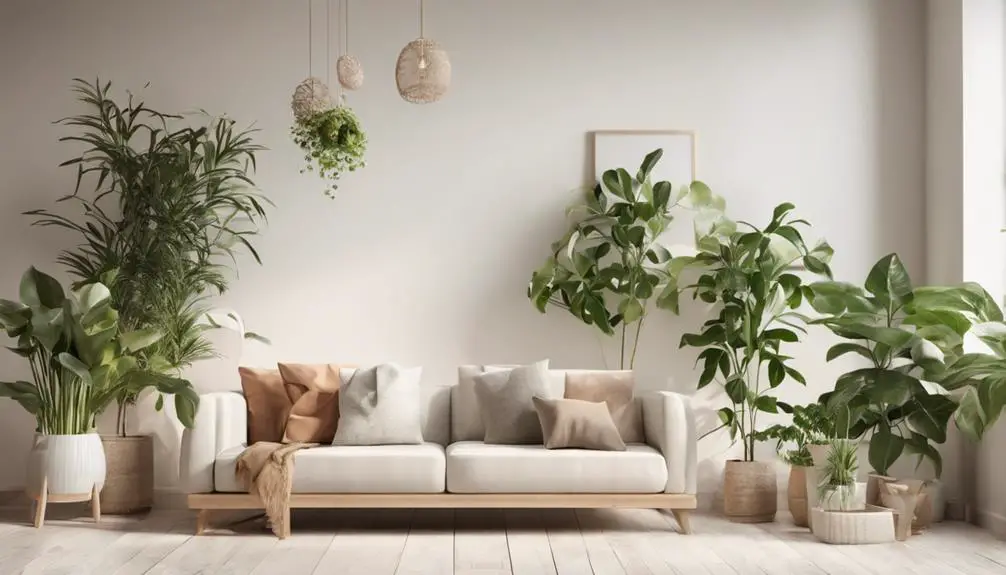
To truly harness the power of Feng Shui in enhancing the energy of your indoor space, it's crucial to first grasp the fundamental principles of this ancient Chinese practice. At its core, Feng Shui basics involve balancing life's energies, often referred to as 'Chi', in your living or work space. It's all about harmonizing energy flow to promote health, prosperity and overall well-being.
Understanding the five Feng Shui elements—wood, fire, earth, metal, and water—is essential. Each element is associated with a certain direction and has a specific impact on the energy within your space. For instance, wood represents growth and creativity, while water symbolizes wealth and career. They're not just symbolic but have practical applications in Feng Shui design.
The Bagua map is another key principle. It's a grid laid over your floor plan that helps you understand how different areas of your space connect to specific aspects of your life. By arranging your environment according to these principles, you can enhance the energy flow and attract positive forces.
Relevance of Plants in Feng Shui
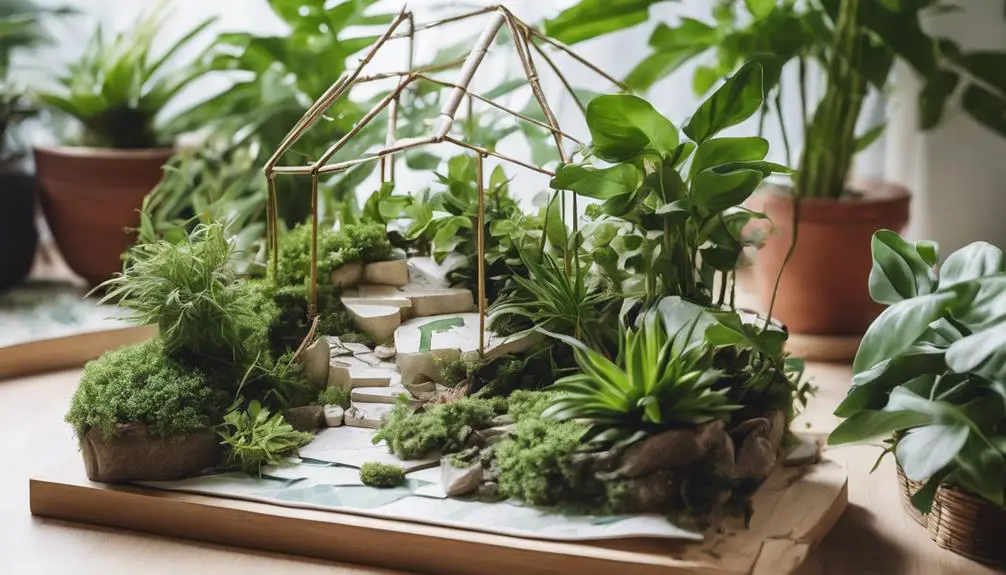
After mastering the principles of Feng Shui, you'll find that plants play a significant role in this ancient practice, with their ability to purify the air and create a harmonious environment. This isn't just about beautifying your space but also about achieving an energy balance with plants.
Understanding plant symbolism in Feng Shui is crucial to this balance. Each plant represents specific elements and energies. For instance, plants with rounded leaves symbolize wealth, while those with pointed leaves represent protection. Thus, the types of plants you choose, their placement, and even their number can influence the energy flow in your space.
Moreover, plants contribute to the energy balance by purifying the air and releasing positive energy. They absorb the harmful toxins from the environment, promoting physical and mental well-being. This is particularly beneficial in today's world, where stress and pollution are rampant.
Therefore, incorporating plants in your Feng Shui practice isn't just about aesthetics, but a strategic move towards achieving an optimal energy balance in your space. Remember, it's not just about having plants, but about selecting the right ones based on their symbolism in Feng Shui. In the next section, we'll guide you on choosing the top lucky indoor plants.
Top Lucky Indoor Plants
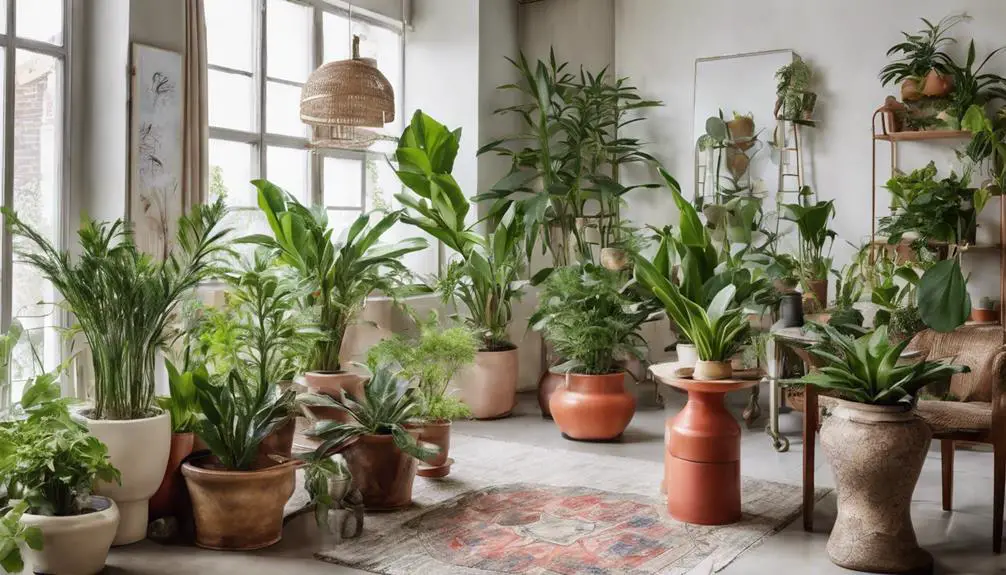
In your quest for a balanced and harmonious environment, you'll find these top lucky indoor plants to be invaluable allies. Plant symbolism in Feng Shui plays a significant role in creating positivity and good luck. Each type, with its unique aesthetics, contributes differently to the flow of energy, or chi, in your living space.
The Jade plant is a popular choice due to its association with wealth and prosperity. Its lush and glossy leaves reflect indoor plant aesthetics at its finest, adding a touch of green luxury to your home.
Next is the Lucky Bamboo, a symbol of strength and flexibility. Its slender, elegant stalks can be trained into various shapes, reflecting your personal style while promoting positive energy flow.
The Money Tree, with its braided trunk and bright green leaves, represents growth and resilience. It's said to bring good luck and financial success, making it a favorite in many households.
The Peace Lily, besides purifying the air, signifies tranquility and harmony. Its delicate white blooms add a touch of elegance to any room.
These plants not only enhance your indoor aesthetics but also bring luck and harmony according to Feng Shui principles. Choose wisely and let these plants aid in your journey towards a balanced life.
Caring for Your Feng Shui Plants
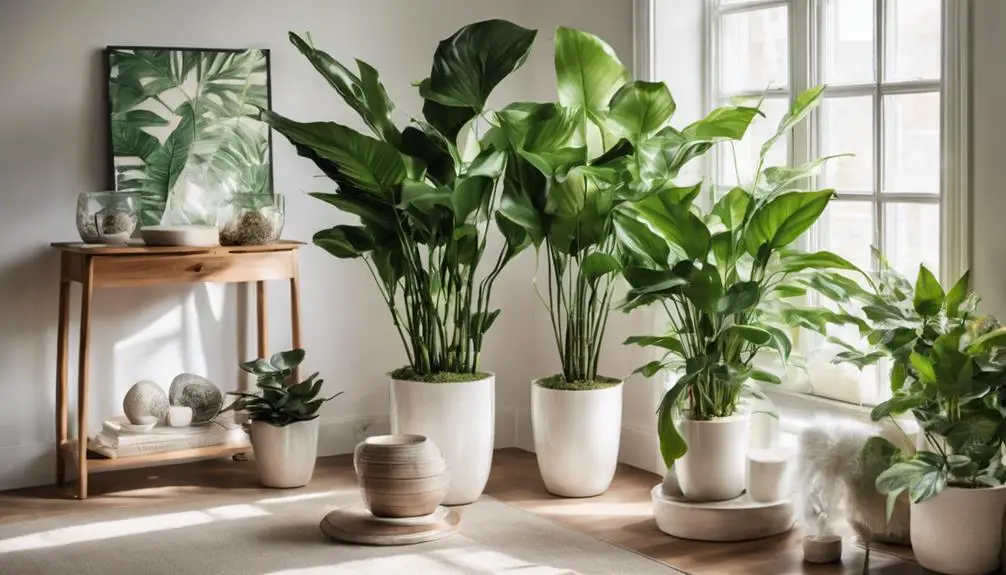
While choosing the right plants is essential, knowing how to care for your Feng Shui plants is equally important to maintain their energy and aesthetic appeal. Proper care involves precise watering techniques and diligent pest prevention.
Firstly, let's talk about watering. Most Feng Shui plants prefer their soil to be kept moderately moist. Over-watering or under-watering can stress the plant, disrupting its positive energy. To keep your plant happy and healthy, you'll need to learn its specific watering needs. For example, a Money Tree likes to dry out between waterings, while a Lucky Bamboo prefers consistently moist soil. Always use room-temperature water to avoid shocking the plant.
Secondly, pest prevention. Pests can quickly damage and potentially kill your plant, which is a big Feng Shui no-no. Regularly inspect your plant for signs of pests like aphids or spider mites. If you spot any, use an organic insecticidal soap to gently but effectively eliminate them. Remember, prevention is better than cure, so keep your plants clean and well-maintained.
Positioning Your Plants for Prosperity
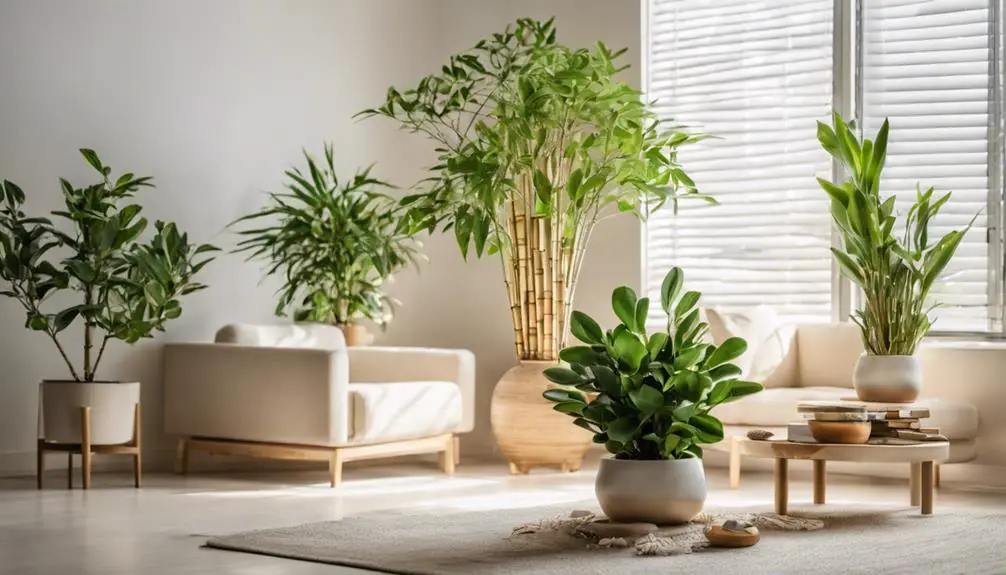
Harnessing the full potential of your Feng Shui plants isn't just about selection and care, it's also about where you place them in your home for optimal prosperity. The art of plant placement techniques in Feng Shui is crucial in prosperity attraction methods.
Here's a simple table to guide your plant positioning:
| Area of Home | Plant Type | Prosperity Impact |
|---|---|---|
| Front Door | Jade Plant | Attracts wealth and success |
| Living Room | Pothos | Enhances energy and abundance |
| Office Desk | Lucky Bamboo | Boosts career luck |
Your front door, living room, and office desk are key areas to focus on. A Jade plant near the front door is believed to invite wealth and success. In the living room, a Pothos can enhance energy and abundance, while a Lucky Bamboo on your office desk can boost your career luck.
Frequently Asked Questions
What Specific Benefits Can I Expect From Having Lucky Indoor Plants in My Home?
Positioning plants in your home can impact your mood, productivity, and overall well-being. Depending on the Feng Shui colors you choose, you can enhance certain energies.
Green plants can foster growth and renewal, while red ones might stimulate passion and courage. They'll also improve air quality by absorbing toxins and releasing oxygen.
It's more than just decor; it's about creating a balanced, harmonious environment that aligns with your personal energy and lifestyle.
Can I Use Synthetic or Fake Plants Instead of Real Ones for Feng Shui?
While you can use fake plant varieties in your home decor, they won't provide the same feng shui benefits as real ones. Synthetic plant maintenance is easier, but they lack the vital energy real plants bring.
Feng shui emphasizes connection with natural elements, which fake plants don't offer. So, if you're looking to enhance your home's feng shui, it's better to opt for real plants.
Are There Any Lucky Indoor Plants That Are Harmful to Pets?
Yes, some indoor plants considered 'lucky' can be harmful to pets. It's crucial you're mindful when choosing plants for your home.
Key factors include identifying toxic plants like Sago Palm or Dieffenbachia, which can be detrimental to your pet's health.
However, don't worry, there are pet-friendly alternatives such as Boston ferns or spider plants.
Always research or consult a vet before introducing new plants to ensure your pet's safety.
How Often Should I Replace or Add New Plants to Maintain Good Feng Shui?
To maintain positive energy, you don't necessarily need to replace plants often. Instead, focus on plant positioning and caring routines. Ensure they're in places that encourage growth and don't cause stress. Regular watering, proper sunlight, and timely pruning will keep them thriving.
It's more about nurturing what you have than constantly adding new. However, if a plant dies, it's best to replace it immediately to keep the energy flowing.
Can These Plants Be Used in Office Spaces to Improve Feng Shui?
Absolutely, these plants can be used in your office spaces to enhance the Feng Shui. Office layout considerations are key when placing your plants to balance the energy and boost productivity.
Remember, plant maintenance tips should be followed for optimal growth. It's not just about having the plants, but also caring for them properly.
They'll not only beautify your workspace but also promote a more positive and harmonious environment.
Conclusion
In conclusion, harnessing the power of Feng Shui with indoor plants isn't merely about aesthetics. It's a strategic move to improve your fortune and well-being.
Remember, your chosen plants need proper care and positioning to function effectively. So, ensure they're healthy, and place them in prosperous zones.
Embrace these Feng Shui principles and get ready to witness a positive transformation in your life. After all, who wouldn't want a little extra luck?

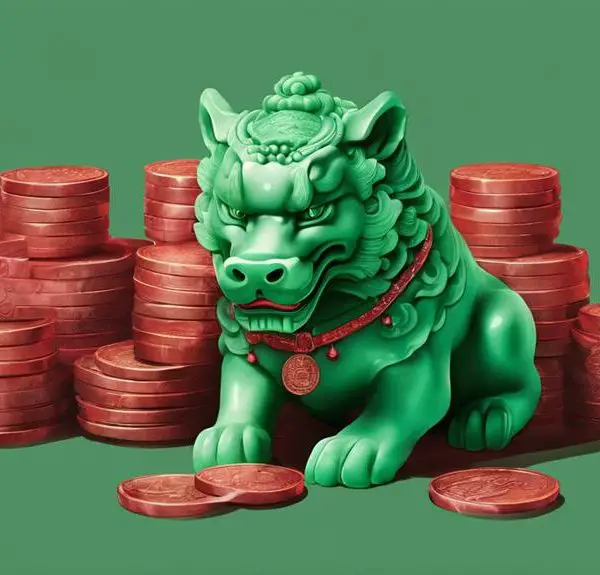
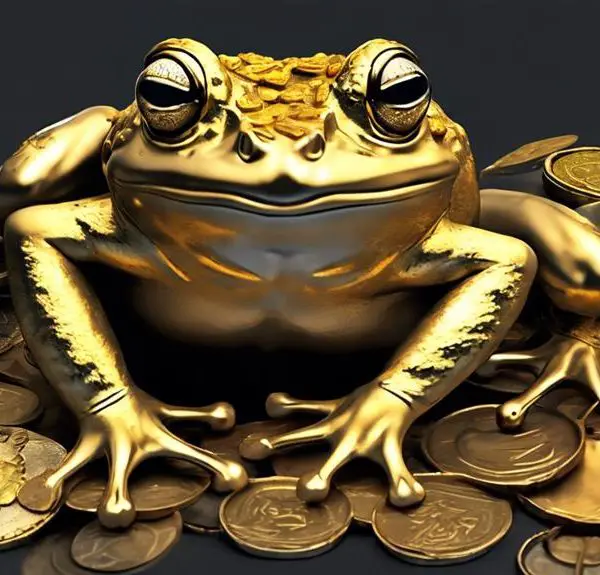
Sign up